23+ Sample Event Management Plan Templates
-
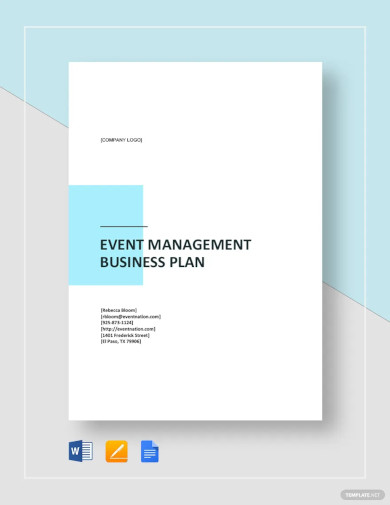
Event Management Business Plan Template
download now -
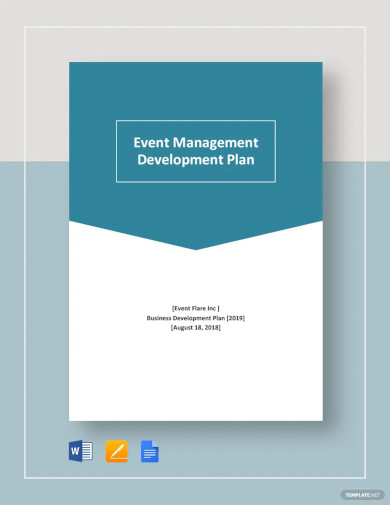
Event Management Development Plan Template
download now -
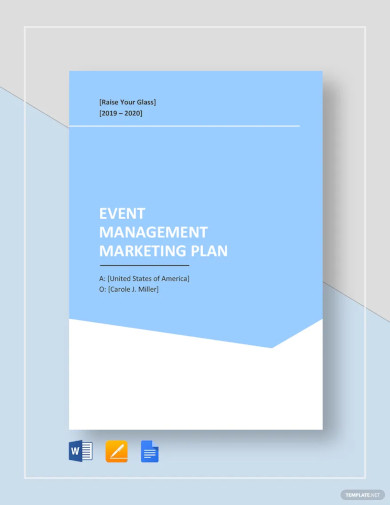
Event Management Marketing Plan Template
download now -
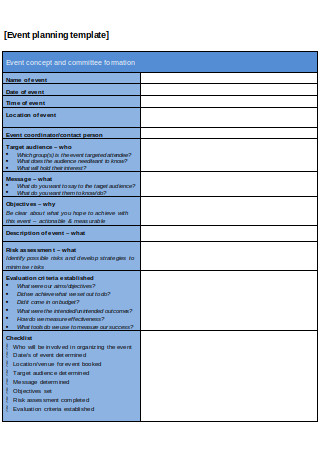
Event Project Planning Template
download now -
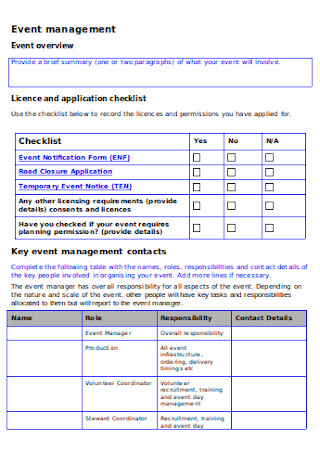
Event Management Plan Template and Guidance Notes Outline
download now -
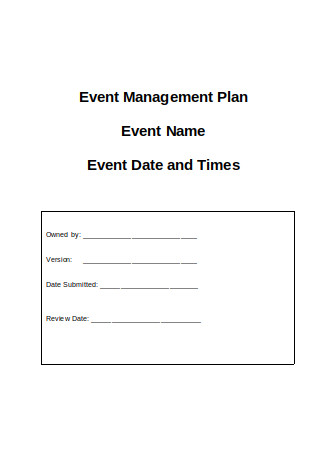
Event Management Chart Plan
download now -
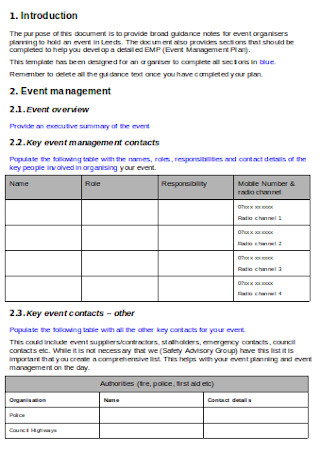
Event Risk Management Plan
download now -
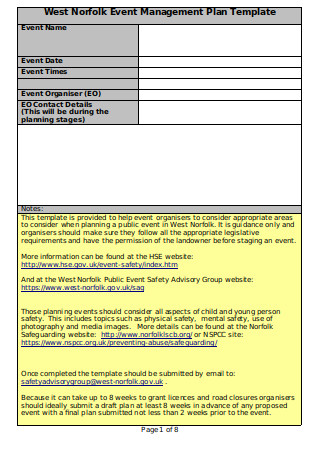
Event Organizer Management Plan (EMP) Checklist
download now -
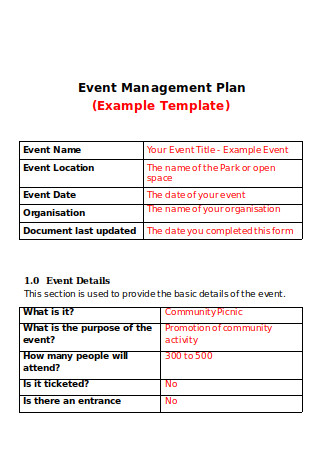
Event Organizational Chart Management Plan Example
download now -
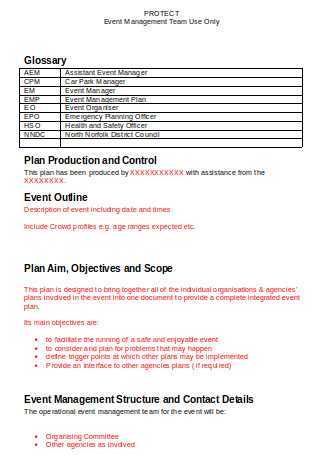
Generic Event Introduction Management Plan
download now -
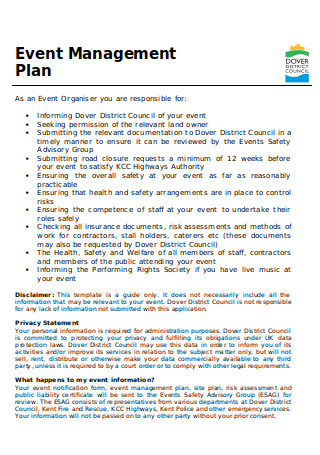
Basic Event Preparation Management Plan
download now -
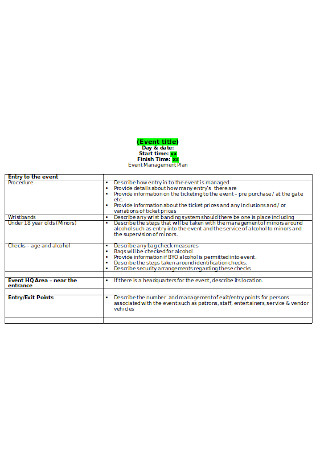
Editable Event Marketing Management Plan
download now -
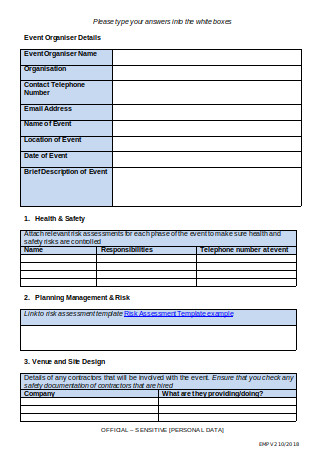
Event Safety Management Proposal Plan
download now -
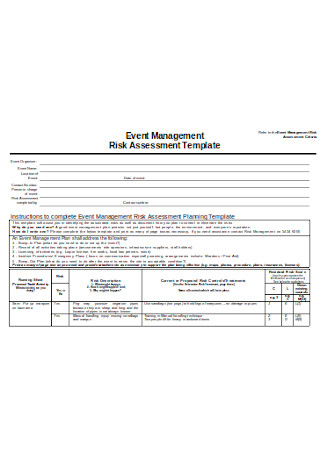
Event Management Flow Planning
download now -
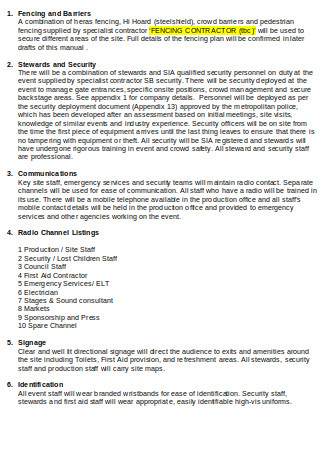
Festival Event Management Plan Executive Summary
download now -
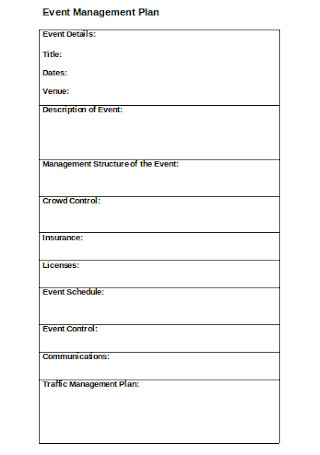
Event Management Budget Plan in Word
download now -
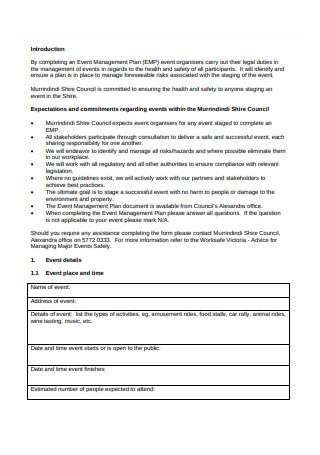
Event Management Plan in PDF Template
download now -
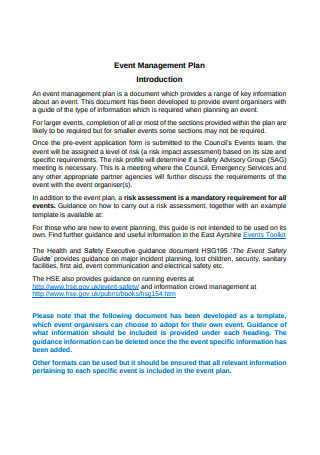
Event Management Plan Guidance
download now -
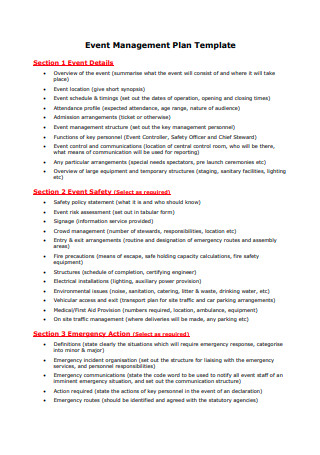
Sample Event Management Plan Template
download now -
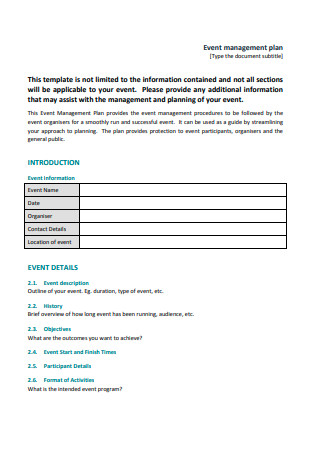
Printable Event Management Plan
download now -
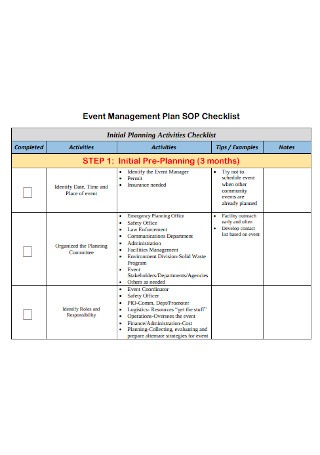
Event Management Plan SOP Checklist
download now -
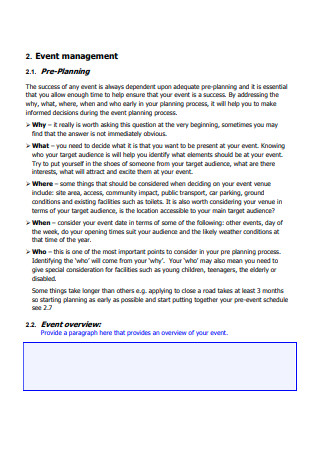
Model Event Management Plan
download now -
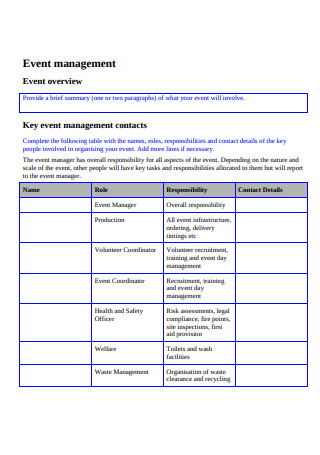
Event Management Action Plan
download now -
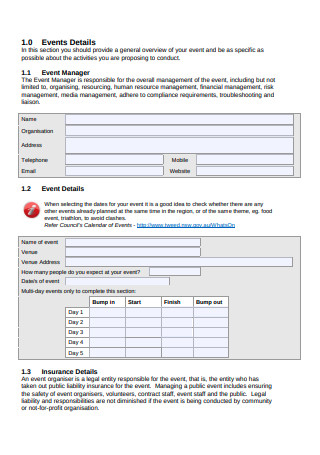
Event Management Plan Proforma
download now
What Is an Event Management Plan?
Managing events involve a lot of tasks such as budgeting, strategizing, organizing, and a whole lot more. With all the things that you need to keep in mind, it is best if you keep everything in a single document. That is why, for your event’s organizational safety and security, using an event management plan is more than a great idea
Various events have become successful both in the past and the present, all thanks to event management plans. In fact, the United States alone has hosted around 1.8 million corporate events such as conventions, trade shows, staff and board meetings, and many more. Other than that, these plans also paved the way for many successful family events such as weddings, anniversaries, and birthdays as well as academic events.
Event managers play an instrumental role in the making and execution of management plans for various activities. They may not be directly responsible for contacting vendors and sponsors, managing the budget and schedule, and running the actual event. Still, they are the ones who spearhead it and sets the roadmap to success. They are also the ones who identify the right people to do the right tasks. For those who are setting out a career as an event manager, getting into the event industry shouldn’t be overwhelming. In the United States, there is a projected growth among event planners over a rate of 11% ten years from 2016, which is speedy than the usual 7%.
Why Should You Use an Event Management Plan?
Managing events is a complicated task that requires tools?such as event management plans?to deal with its complexity. Going through it with an event management plan might also be a tedious process because it is a whole other task that you need to fulfill, but going through such a process is better than going without one.
If you are still not convinced to start making and using a management plan, here are the reasons why that should make you think twice.
No More Money Down the Drain
Even if you are only hired to manage an event, this should not mean that you can spend money carelessly, especially if you were given a budget to follow through. Managing events can be costly. You need to pay for the venue, suppliers, marketing, talent, print materials, and so on. With all the expenses you need to remember, one wrong move means money down the drain.
To avoid wasting your money or your client’s money, keeping track of all the event’s expenses in an event management plan will enable a bird’s eye view of where your money or the budget goes. If you know where the money goes, you can determine areas where you can possibly find ways to make the most out of an event budget, such as negotiating the rates of venues, suppliers, and the like.
Makes Ideas and Events Extra Special
Without a shadow of a doubt, as event managers and organizers, you know you are capable of producing and bringing brilliant ideas into life to make events extra special. However, you are only a human, and being one means you are perfect enough that you can always spew out creative event ideas and also keep track of it all in your head. This is when the role of event management plans enter.
This management plan is not a guarantee that you will generate ideas as soon as you start keeping one. However, it ensures that you can surely come up with one, especially if you get a hold of an event management plan template that has a well-thought-out layout. It also allows you to save yourself from the hassle of keeping track of your ideas when these pop out unexpectedly.
Paves the Way for Grand Event Plans
If you have been an event manager for quite some time now, you already know that every successful event management requires intensive planning. Unfortunately, all of the plans that you and your team can come up with will only go to waste if you have no place to keep a record of it. An ordinary notebook and a plain sheet of paper won’t simply cut it?you need an event management plan to keep track of the details of all your grand future activities.
With an event management plan, you can set your clear objectives for the event. If you are working with a team, you can conveniently assign each of your members with responsibilities and stay updated with their progress using a single tracker. Everyone will also be on the same page with all the targets you have set for the team. This document has the actual power to bring you and the rest of your team peace of mind when dealing with the tasks involved in event management.
Anticipate Risks and Ensure Safety?All at the Same Time
When you are told to ‘think positive’ in general, anticipating risks is definitely not something that would come into your mind. But when it comes to event management, one of the most important tasks involved in managing events includes risk and safety management. This is a crucial task that your mind could not simply handle alone without any tool to aid it. Plus, you also need to come up with plans on how you can secure the safety of everyone, especially now that you have a list of possible risks in mind. Hence, you would need the help of an event management plan.
Regardless of whether the event you will manage is a big one or not, always treat the safety and security of the attendees as your prime importance. With a management plan in place, it will then be easier for you to carry out a risk assessment, determine the possible hazards, create emergency action plans, and implement safety practices throughout the event.
Make Every Event Management Plan Work: Crucial Skills You Need
You can craft the best event management plan in the world, but it will be nothing without possessing the crucial skills that will materialize your plans into action. If you want to be better at your career as an event manager and that you also want to make the most out of every event management plan, then check out some of the essential skills you might want to put into play.
How Do You Craft an Event Management Plan?
With all the details that go into an event management plan, you need all the tips and guides in the world to ensure that everything goes well with your plan. With that said, take notes of some guidelines you can use and keep in mind as you plot and craft your very own event management plan.
1. Create and Comprehend Event Objectives
Setting objectives make every single member of a team on the same page right from the very start. Hence, it is important to establish these at the very beginning of every event management plan. Any plans, regardless of its nature and complexity, will ultimately fail without clear objectives in mind. Know what you want to achieve in the end. Do you want to drive sales to your new line of products? Do you want to increase your target market’s brand awareness regarding your new business? If you want a good start to this endeavor, determine your endpoint, and comprehend what needs to be done to accomplish these.
2. Determine the Required Tasks
Upon setting your goals and understanding what needs to be done in order to accomplish these, it will then be easier to determine the wide range of tasks. This includes many steps such as selecting the date and venue of the event, organizing the management team, looking for suppliers, plotting the budget and schedule, laying out the communication and event marketing strategies, organizing the management team, establishing the budget and schedule, setting the date, booking the event venue, and so on. Knowing the tasks is important as this sets the flow of your entire management plan.
3. Create a Risk and Safety Management Plan
A lot of people miss the fact event management planning is not just all about the aesthetics of the event, but it also includes creating a safety and risk management plan. Events, even most of these are inherently fun endeavors, can get dangerous. If it’s a concert event, you run into the risk of overcrowding. If it is a celebratory event, the multitude of lighting equipment can possibly cause electrical challenges. Creating risk and management plans does not mean that you want accidents to happen. It’s a precautionary measure that allows you to determine the ideal actions to carry out if unwanted circumstances occur.
4. Keep Track of Everything You Have Planned
On the day of the event itself, make sure that you consistently keep track of whether your event is going according to your plan. It is completely alright if it’s not; however, ensure that you are keeping track of all the changes in the document to be reminded. No matter how well prepared your plans are for the event, it will be pointless if you will leave it behind and not use it during the actual event.
Events, no matter how well-planned they may be, will always have room for unexpected. That is why it is always ideal that you are backed up with a plan, specifically an event management plan. The past and present have shown us many events, and they may have never been successful without the help of event management plans. Make yours successful as well by downloading and customizing any of the event management plan samples uploaded in this article.
